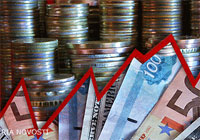Things picking up? Rencap-NEC upgrade 2H13 growth forecast

(Business New Europe – bne.eu – June 17, 2013) The great debate in Russia is if growth has stalled or if the economy is only going through a soft patch at the moment.
GDP growth fell to 1.6% in the first quarter (revised up from the initial estimate of 1.1%). But that is still not very good. Industrial production growth seems to have stopped completely and domestic fixed investment growth is actually negative.
These terrible figures have sparked a big debate on what to do to bolster the economy. Russian President Vladimir Putin is clearly worried and has ordered the Cabinet to come up with growth-boosting ideas, but has the federal budget is only just breaking even (and was briefly in deficit in the first quarter) there doesnt seem much that the government can do to bolster growth in the short term.
Parallel to these woes is the change of guard at the Central Bank of Russia (CBR) where inflation-buster Sergei Ignatiev just chaired his last policy meeting before he is replaced by francophone Elvira Nabiullina. Ignatiev delivered a mild surprise by holding interest rates unchanged, as inflation at 7.4% is still too high, whereas Nabiullina is widely expected to deliver 0.5%-0.75% of cuts through to the end of the year starting with the next policy meeting at the start of July. The hope is cutting interest rates during the summer, when inflation traditionally falls, will deliver some extra growth. A lot depends on how good the harvest is this year as a result, because if it is bad inflation will stay high.
On the back of all this glum news almost all the analysts have been marking their expectations for growth in 2013 down from the consensus 3.5% at the start of this year to anything between 3.1% and 1.5%.
Renaissance Capital has been at the forefront of this increasing cautious outlook, but Ivan Tchakarov chief economist and editor of the banks well respected Rencap-NES Monitor, which it produces together with the economists at the New Economics School (until recently headed by Sergei Guriev, now in self-imposed exile in Paris) has changed his mind.
According to the RenCap-NES leading GDP indicator, our final estimate of 2Q13 GDP growth is 2.2% YoY. This is up from the 1.5% we projected in May. Our final GDP estimate is based on information available as of the end of May. On a QoQ seasonally adjusted (s/a) basis, GDP is projected to grow by 0.6%, following the 0.3% QoQ s/a growth in 1Q13, Tchakarov wrote in a note on July 16.
This is good news, especially coming from Tchakarov, who recently released a paper arguing that Russia has fallen into the middle-income trap where rising incomes outpace rising productivity and leave the economy in stagnation. However, now he is arguing that the first quarter of this year was the bottom of the crisis and four factors will boost growth in the second half of this year.
First, 1H12 had a very high base, with GDP growing at 4.5%, while 2H12 was a low base, with growth of only 2.6%. Therefore, we are likely to get a purely mathematical boost in 2H13, deriving from the favourable base effect.
Second, the Ministry of Agriculture expects the 2013 harvest to be bountiful, amounting to an estimated 95mnt of grain. This would represent a significant 30% increase on the 72mnt of harvest last year, leading to a slower pace of food, and overall, inflation.
Third, this in turn would allow the Central Bank of Russia (CBR) to initiate a rate-cutting cycle at its policy meeting in July, which will also provide a helping hand to the economy.
Finally, the decelerating pace of consumer inflation will also increase the real purchasing power of consumers, leading to expectations of more robust consumer spending in 2H13. We expect full-year GDP growth of 3.0% (vs estimates of 2.4% from the Ministry of Economic Development [MinEcon], 2.8% Bloomberg consensus and 3.4% from the IMF), Tchakarov wrote today.
Finally, like everyone else, Tchakarov expects the gains to be boosted after Nabiullina takes over and starts cutting rates in July.
Governor Ignatiev has been consistently arguing against lowering rates in the past six months or so, but we think the arrival of Nabiullina should change the policy bias at the CBR to a more accommodating position. We believe the soft real economy and the expectation that inflation should moderate over the next couple of months should provide the perfect backdrop for the CBR to cut rates in July by 25 bpts. We see at least 50 bpts of cumulative easing by year-end, Tchakarov wrote.
